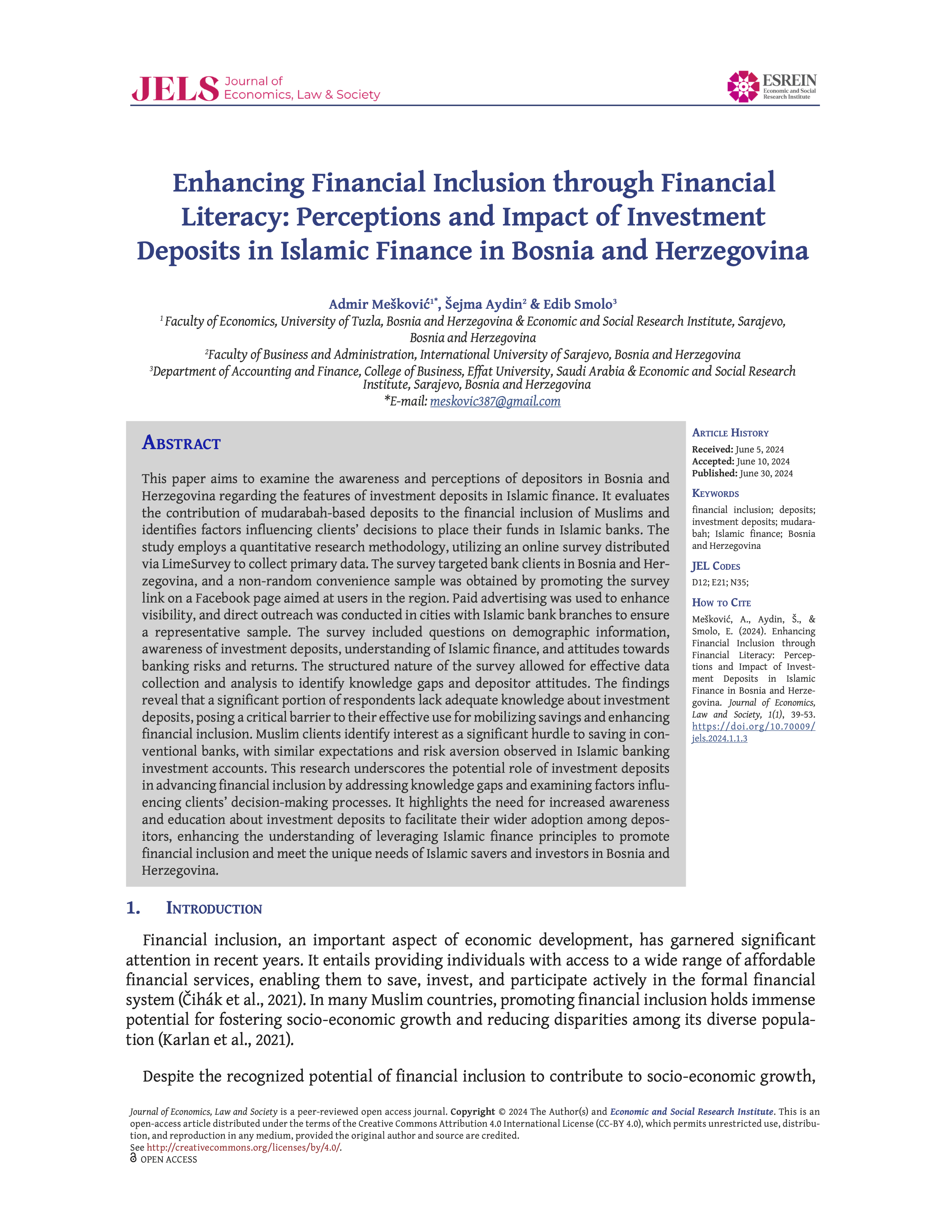Enhancing Financial Inclusion through Financial Literacy
Perceptions and Impact of Investment Deposits in Islamic Finance in Bosnia and Herzegovina
DOI:
https://doi.org/10.70009/jels.2024.1.1.3Keywords:
financial inclusion, deposits, investment deposits, mudarabah, islamic finance, Bosnia and HerzegovinaAbstract
This paper aims to examine the awareness and perceptions of depositors in Bosnia and Herzegovina regarding the features of investment deposits in Islamic finance. It evaluates the contribution of mudarabah-based deposits to the financial inclusion of Muslims and identifies factors influencing clients' decisions to place their funds in Islamic banks. The study employs a quantitative research methodology, utilizing an online survey distributed via LimeSurvey to collect primary data. The survey targeted bank clients in Bosnia and Herzegovina, and a non-random convenience sample was obtained by promoting the survey link on a Facebook page aimed at users in the region. Paid advertising was used to enhance visibility, and direct outreach was conducted in cities with Islamic bank branches to ensure a representative sample. The survey included questions on demographic information, awareness of investment deposits, understanding of Islamic finance, and attitudes towards banking risks and returns. The structured nature of the survey allowed for effective data collection and analysis to identify knowledge gaps and depositor attitudes. The findings reveal that a significant portion of respondents lack adequate knowledge about investment deposits, posing a critical barrier to their effective use for mobilizing savings and enhancing financial inclusion. Muslim clients identify interest as a significant hurdle to saving in conventional banks, with similar expectations and risk aversion observed in Islamic banking investment accounts. This research underscores the potential role of investment deposits in advancing financial inclusion by addressing knowledge gaps and examining factors influencing clients' decision-making processes. It highlights the need for increased awareness and education about investment deposits to facilitate their wider adoption among depositors, enhancing the understanding of leveraging Islamic finance principles to promote financial inclusion and meet the unique needs of Islamic savers and investors in Bosnia and Herzegovina.
Author BiographyEdib Smolo, Department of Accounting and Finance, College of Business, Effat University, Saudi Arabia & Economic and Social Research Institute, Sarajevo, Bosnia and Herzegovina
Dr. Edib Smolo is an Assistant Professor and former Chair of the Finance Department and Director of the Master of Science in Finance program at Effat University, Jeddah, Saudi Arabia. Additionally, he is the Global Shari'ah Coordinator for a fintech startup based in Karachi, Pakistan. With experience in Islamic banking and finance, he has worked in a wide range of countries and for numerous multinational corporations and government agencies.
Prior to this position, he served as Assistant Professor and Vice-Dean for Scientific and Research Activities at the International University of Sarajevo's Faculty of Business and Administration. His previous positions included International Islamic Finance Manager at Tosan, Iran, and Islamic Finance Manager at Indra Technology Solutions Malaysia. During his time at International Islamic Liquidity Management Corporation (IILM), he developed the first short Islamic instrument with a global consensus that won the 2013 REDmoney global deal award. In a previous role, he worked as a researcher and coordinator for the Islamic Banking & Capital Markets unit at the International Shari'ah Research Academy (ISRA).
He holds a Ph.D. from the International Centre for Education in Islamic Finance (INCEIF), Malaysia’s Global University of Islamic Finance. His degrees include a Bachelor of Economics (Honours) and a Bachelor of Islamic Revealed Knowledge and Heritage (Honors), as well as a Master of Economics from International Islamic University Malaysia (IIUM), Malaysia. As part of a joint initiative formed by the New Bulgarian University and the Council of Europe, he also holds a Certificate for Professional Specialization in Political Management from the Bulgarian School of Politics.
In addition to writing and co-authoring several chapters in books, he also contributed to refereed journals on a variety of topics. He published “Introduction to Islamic Economics and Finance: Theory and Practice” in Bosnian in 2013. Aside from Islamic banking and finance, his interests include economic growth and development, financial development, market structure (bank concentration/competition), and EU and Western Balkan economic and financial issues. Additionally, he is a regular speaker, trainer, and consultant on various Islamic finance topics.
In addition to the EU and Western Balkans, he is open to collaboration with interested parties in other regions and for research and project collaboration.

Additional Files
Published
Issue
Section
License
Copyright (c) 2024 Admir Meskovic, Šejma Aydin, Edib Smolo

This work is licensed under a Creative Commons Attribution 4.0 International License.





